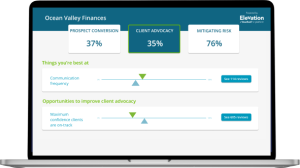Are you ready for Consumer Duty? Top advice firms share 7 key steps to success
With the implementation deadline for Consumer Duty now just six months away, we asked three firms what they’re doing to prepare for success.
Whatever their level of readiness, all the firms spoke to the functional and cultural changes required, with the clearest message of all being, ‘START NOW.’
With six months to go, what do you need to know?
1. Don’t panic
Implementing Consumer Duty can seem daunting. It’s a big piece of legislation. However, it’s really “just an iteration from the FCA to raise and better define standards,” says Caroline Cochrane, from Verity Financial Planners, so the advice is not to panic. Caroline has been an adviser for over 30 years and isn’t worried by the new Consumer Duty requirements.
This was echoed by Morven Grierson, Compliance Director at MKC Wealth, who says, “Consumer Duty gives us the formal mandate to do everything we want to”. MKC Wealth was founded in 2022 with Consumer Duty in mind by ex-Quilter director, Dominic Rose.
Breaking work down into smaller tasks can help stop you feeling overwhelmed. “It’s about getting that work into bite size chunks,” says Thomas Court, Compliance & Policy Support Officer at Leeds-based consolidator and advice firm, Progeny. “If you haven’t started [preparing for Consumer Duty], start now. A journey of a thousand miles starts with a single step”.
Morven agrees with the approach of chunking work. “The 4 outcomes are broken down nicely into your proposition so you should be able to do a really clear gap analysis for each of the outcomes”.
There are online resources available to help. Thomas recommends watching the FCA’s webinars and using material from compliance support services.
“If you’re part of a network, adopt their rules – you have to trust they’ll get it right” says Caroline. “If you’re directly authorised, take the guidance from compliance support providers as a minimum and decide if you want to do more”.
2. Be prepared to show your workings
Possibly the biggest change imposed by Consumer Duty is having to “show your workings”. Most advisers provide great financial advice. Consumer Duty isn’t going to change that, but it will require firms to better document why they provided that advice, and how they’ve confirmed afterwards that it was effective.
All three firms are planning to use their back-office systems to hold data. “We’re planning to make a lot more notes in our back-office system [Intelliflo Office],” says Caroline, ”both in the meetings and to record the outcomes”.
Having recently moved to Curo by Time4Advice, Thomas says, at Progeny, “we’re working with the departments on what evidence they have and what it’s showing. The MI is only as good as the input”. MKC Wealth uses WealthCraft (Morningstar) as their back-office system and will record Consumer Duty data there.
3. Think about what data you’ll need
Data collection has historically been limited to advice suitability and customer satisfaction. Consumer Duty runs on feedback, therefore gathering data from all processes will be required. How and when to review the data is a key decision. Like most firms, the three we spoke to were currently undecided on their data-review strategy.
Many measures are subjective, so the best feedback is directly from clients. MKC Wealth uses Elevation, a new system from VouchedFor, to collect feedback from its clients. “It’s too easy to get embroiled with internal management informationI. What does the client think about it?” says Morven.
Firms using Elevation will soon be able to create bespoke alerts when feedback shows particular markers of risk. All three firms plan to use technology, as well as human interaction at annual reviews, to gather data.
Gathering regular feedback will help with Consumer Duty. Benchmarks from Elevation show that only 24% of firms currently invite regular client feedback. Moreover, only 7% of firms ask prospective clients for feedback, which Thomas said Progeny is considering.
4. Review your technology
Technology will be key for most firms in their Consumer Duty strategy. We anticipate switched-on firms will adopt more technology, or better use their existing solutions, to remove some of the operational burden and free up resources.
“Covid made us get used to technology – it was a gift”, says Morven. “Elevation is a really great way of gathering data from our clients. [VouchedFor] does the reporting for us so they take some of that operational burden off our hands”.
Whatever technology you currently use, now is the right time to review it with the reporting requirements of Consumer Duty in mind.
5. Segment your clients for communications
The Consumer Understanding outcome states customers should be “given the information they need, at the right time, and presented in a way they can understand.”
These requirements will test the communication plans of firms and could be difficult to implement without good client segmentation and technology to support the process.
“[We’ll be] trying to use tech to communicate in a more frequent and timely manner,” says Morven. “What we want to do this year is look at what’s happening around us. There’s the cost-of-living crisis, lots of concern about health and wellbeing and uncertainty about our country’s future. All this stuff spooks our clients. If we’re not reassuring our clients at the right time, that’s a problem”.
Good communication reassures clients and the only way to be sure they’ve understood is to ask them. Currently there’s room for improvement, as Elevation data found that 59% of clients felt communications from their adviser “could be clearer”.
6. Embed Consumer Duty at every level of the organisation
The FCA is clear that Consumer Duty is for everyone, not just compliance, so everyone in a firm should understand the requirements and the part they play.
According to Thomas, Progeny has made Consumer Duty a “business project” that is everyone’s responsibility. “We’ve done training with our senior leadership team and it’s now filtering that down”.
Training is also on Morven’s mind at MKC Wealth, “We’re currently looking at our training plans for advisers. Are advisers getting under the bonnet with clients or are they just skimming the surface? If we can…produce great financial plans that really resonate with the client, then that means that client sticks with us.”
Firms must ensure that all areas of the organisation know how the Consumer Duty affects their role, and should have a plan in place to provide training or information relevant to each discipline.
7. Take time creating effective vulnerable client processes
Consumer Duty requires firms to ensure (and evidence) that potentially vulnerable clients receive outcomes as good as non-vulnerable clients.
Caroline feels the need to keep better records. “We’re going to be reviewing and categorising all our [existing] clients as vulnerable or not, as we’ve not been recording this on every file until now. We’ll also be updating our processes to show how vulnerable clients get the same service [as non-vulnerable clients] and record everything in notes.”
Vulnerability is also on Morven’s mind at MKC Wealth. “We’re going to make sure we segment or focus on these clients so that they are being looked after the right way.”
Elevation allows firms to segment survey responses from potentially vulnerable clients so that you can quickly and easily see how they rate their outcomes compared to non-vulnerable clients. It also allows custom definitions of vulnerability to match your internal definition.
The benefits of getting it right
Consumer Duty is going to mean change for firms, however, there’s a real opportunity to improve your business. The additional feedback is a great way to broaden and deepen client relationships.
By using client feedback to optimise your processes, and the client experience, you can increase how valued your clients feel. Thomas, from Progeny, says, “If we help our clients, that should mean our clients become advocates and the business grows. By treating clients as they should be treated, they’ll tell others about us.”
___________________________
Elevation, from VouchedFor, uses client feedback to drive business growth. Powered by 250,000 clients’ feedback, it identifies which factors make the biggest positive difference to client experience, and uses carefully engineered questions within a client survey to reveal how advice firms are tracking against them.
Elevation helps you drive advocacy from existing clients, improve conversion of prospective clients, and mitigate risk by identifying issues early. It can also form part of your ongoing response to the Consumer Duty.
To find out how Elevation can help you, or if you’re interested in getting content to help you meet your Consumer Duty, contact elevation@vouchedfor.co.uk




